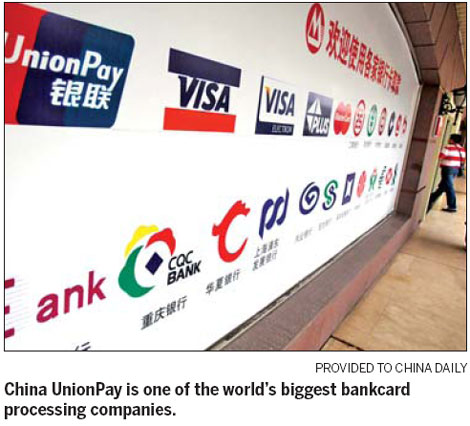Economy
Visa to block some UnionPay services
By He Wei (China Daily)
Updated: 2010-06-04 08:18
 |
Large Medium Small |

SHANGHAI - Visa International, a unit of Visa Inc, the world's largest credit and debit card processor, has asked its global financial member institutions to stop international transactions through the State-owned China UnionPay system from Aug 1.
San Francisco-based Visa International has informed card-issuing banks in China that from Aug 1, international transactions made through double-currency cards with Visa and China UnionPay logos can only be settled through the Visa system.
| ||||
An unnamed official from China UnionPay said in an interview with People's Daily Online that Visa has no right to restrict the payment channels of holders of co-branded credit cards.
The official said China UnionPay has a large enough overseas network to adequately handle such transactions.
Visa charges double-currency cardholders 1 to 2 percent commission for settlements. There is, however, no settlement charge in the China UnionPay system.
Liu Jie, the China regional affairs director of Visa, said on Thursday that his company's action "was a strict implementation of its global operation rules".
"International transactions through other payment networks pose huge risks for Visa cardholders like transaction disputes and data leakage," he said.
Despite the explanation, Visa's action has stirred a hornet's nest especially as China UnionPay is rapidly expanding overseas to cash in on the expected boom in outbound tourism from China.
Most tourists would like to take advantage of the renminbi's strength against most international currencies like the US dollar and the euro.
"Visa's new restriction has highlighted the intense competition between Chinese and foreign card companies, after China UnionPay accelerated its international expansion in the last few years to grab market share," said Fu Jia, a senior investment analyst at Temasek Holdings, the investment fund of the Singapore government.
China UnionPay, which is in its eighth year of operations, is one of the world's biggest bankcard processing companies. It has issued 1.75 billion credit cards, 33 percent of which are co-branded with foreign companies. It has extended its overseas network from 26 countries and regions in 2006 to more than 90 in 2010.
China UnionPay, as the nation's sole bankcard processor, also enjoys monopoly status at home. Therefore "Visa's measure can be regarded as a move in response to it being banned from China's fast growing domestic bankcard market," said an official with a leading credit card issuing bank in Shanghai.
"Both companies have the responsibility and obligation to provide overseas transaction services to co-branded card holders," the China UnionPay official said.
"Neither side has the right to unilaterally restrict cardholders' options for overseas payment channels."
Statistics show that over 44 million people went on outbound trips from China in 2009, 16 times that in 1992.
Overseas consumption by Chinese tourists reached $4.2 billion in 2009, up 4 percent from 2008.
Fu said the Visa charges will have little impact on outbound tourism, but "will create some inconvenience for Chinese tourists going abroad".
Zhang Wu'an, a spokesman for Chunqiu travel agency, said "convenience is always a top priority for travelers. So it is always good to have more than one choice. Visa's moves are unlikely to dampen the outbound tourism boom."

